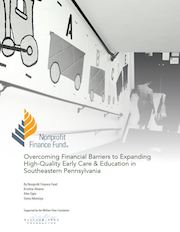Site Search
- resource provided by the Forum Network Knowledgebase.
Search Tip: Search with " " to find exact matches.

High-quality early care and education (ECE) programs have been proven to create positive outcomes for children—especially among those living in poverty. Yet many children from low-income families have a hard time accessing quality child care, and miss the critical developmental growth and foundation needed for academic and life success. Based on Nonprofit Finance Fund's research and analysis of 147 nonprofit child care centers in Southeastern Pennsylvania, the report demystifies the financial, business and systemic barriers to expanding high-quality care—and begins to identify how to increase access for more children.
“A Time for Action: Mobilizing Philanthropic Support for Boys and Young Men of Color” lays out a vision and a bold plan of action to maximize the potential of philanthropy and the private sector to increase opportunity for boys and young men of color that benefits the entire country. While it focuses on systems, policies, and practices that profoundly shape the lives of our sons and brothers, the recommended actions also help to create the conditions for all children and young adults to thrive, regardless of race, ethnicity or gender. The plan is bolstered by $194 million in initial investments in key initiatives, including for example programs to enhance school learning environments and reduce the overrepresentation of young people in the justice system.
The effects of COVID-19 continue to be felt all around New Jersey. In order to dig deeper into the impact of the pandemic on certain communities and stay connected during this difficult time, CNJG worked with our affinity group chairs and other members to develop programming that supplemented our COVID-19 Funders Briefing Series and Newark COVID-19 Series. These virtual affinity and interest group meetings were designed for colleagues to update each other on coronavirus response efforts, hear about the greatest needs in their funding area, and share what they have learned. CNJG members can access the recordings of these past meetings to hear what was said.
TD Bank announced four grant recipients of the 2024 TD Ready Challenge, an annual initiative that supports nonprofit organizations develop effective programs and solutions for communities within the bank's footprint.
Each year, the TD Ready Challenge solicits eligible organizations to submit applications that offer solutions to a different problem statement, with this year's focus being on innovative solutions to support underserved small business owners. Today's grant recipients will each receive $1 million through the TD Ready Challenge to advance initiatives designed to help disrupt barriers for underserved entrepreneurs while supporting the larger needs of the small business community.
Blue Foundry Charitable Foundation, the philanthropic arm of Blue Foundry Bank, awarded $20,000 in grants to six New Jersey nonprofits in the first quarter of 2025, reinforcing its commitment to community support. The foundation focuses its giving efforts on four key areas: affordable housing, education, health and human services, and youth programs.
“Our dedication to the New Jersey communities we serve is at the heart of these grants, ensuring local services have the resources to create a stronger, brighter future,” said James D. Nesci, president and CEO of Blue Foundry Bank and vice president of Blue Foundry Charitable Foundation.
The Summit Foundation board of trustees approved $369,946 in grants to 28 local organizations on June 3, 2025. These grants support a range of initiatives and programs that positively impact public spaces, healthcare, education, the arts, youth development, housing, food distribution and people with disabilities.
“As a community foundation, our goal is to make a meaningful difference in the lives of our neighbors,” said Dana Turk, president of The Summit Foundation. “We address local challenges and open doors to new opportunities for people to thrive. These grants reflect our ongoing commitment to do good by enhancing the well-being and dignity of people living in the Summit area."
In Q4 2025, our foundation awarded 49 grants totaling over $17 million.
Our fourth quarter grantmaking focuses on identifying and fueling the scale of cost-effective programs and solutions that accelerate improvement in key academic and socioemotional outcomes for all children. As always, we place an emphasis on grantmaking and strategic support that unlock innovation, evidence, and growth for our grantees.
We've highlighted just some of the direct impact and ecosystem organizations we’re proud to support this quarter as we conclude our 2025 grantmaking.
CNJG’s first-ever Policy Agenda that includes our approach to the policy work, and five policy priorities.
A CNJG member queried our listserves with the question "Does anyone have templates that can be used and/or shared related to grant approval letters and terms and conditions related to COVID-19 grants?" CNJG compiled the answers from responding members.
